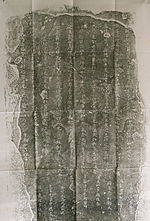Japanese pronouns (代名詞, daimeishi) are words in the Japanese language used to address or refer to present people or things, where present means people...
61 KB (4,883 words) - 14:21, 4 October 2024
a pronoun is "you", which can be either singular or plural. Sub-types include personal and possessive pronouns, reflexive and reciprocal pronouns, demonstrative...
31 KB (3,454 words) - 01:31, 30 September 2024
to their relationship. Aizuchi Honorific speech in Japanese Etiquette in Japan Japanese pronouns Zen ranks and hierarchy T–V distinction (politeness...
37 KB (4,608 words) - 16:58, 1 October 2024
translated as pronouns, these are not used as frequently as pronouns in some Indo-European languages, and function differently. In some cases, Japanese relies...
89 KB (10,156 words) - 16:10, 2 October 2024
Personal pronouns are pronouns that are associated primarily with a particular grammatical person – first person (as I), second person (as you), or third...
26 KB (3,394 words) - 09:49, 4 October 2024
themselves, etc.). English intensive pronouns, used for emphasis, take the same form. In generative grammar, a reflexive pronoun is an anaphor that must be bound...
47 KB (4,896 words) - 03:23, 22 August 2024
Part of speech (category Articles containing Japanese-language text)
Swahili, Bemba, and Luganda. By contrast, Japanese pronouns are an open class and nouns become used as pronouns with some frequency; a recent example is...
31 KB (3,594 words) - 12:49, 19 August 2024
de hanashitekuremasen ka?) Japanese exhibits pronoun avoidance, meaning that using pronouns is often too direct in Japanese, and considered offensive or...
16 KB (2,017 words) - 00:21, 8 September 2024
Old Japanese (上代日本語, Jōdai Nihon-go) is the oldest attested stage of the Japanese language, recorded in documents from the Nara period (8th century)....
76 KB (6,701 words) - 05:20, 8 September 2024
used jibun as a first-person pronoun, while trans men preferred boku. Japanese pronouns Gender-neutral pronoun: Japanese Language and gender Nyōbō kotoba...
19 KB (2,271 words) - 21:39, 29 September 2024


